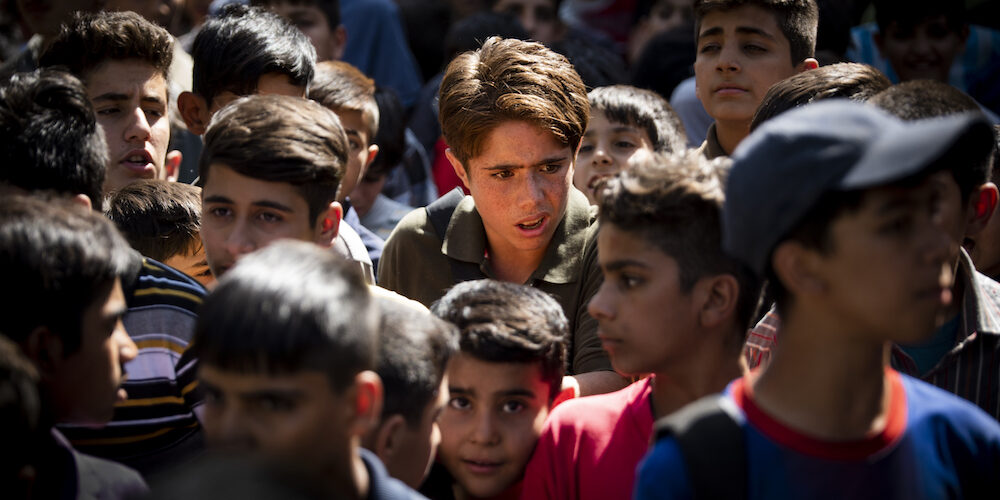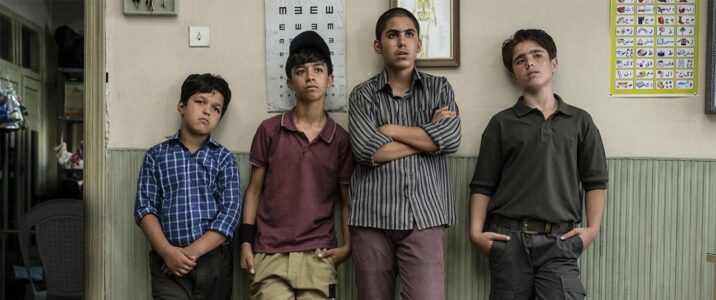Majid Majidi’s Sun Children (Khoršhid) draws inescapable comparisons to his third fiction feature, Children of Heaven (Bačče-hâ-ye âsemân). The breakout success of that film, the first from Iran to be nominated for the International Feature Oscar, was itself part of a longstanding tradition in Iranian cinema where children serve as allegorical figures. Majidi’s latest utilizes its cast of mostly young, non-professional actors for pointed social critique, made apparent in the opening crawl’s reference toward the 152 million children inured to forced labor all over the world. The film’s attempted melding of universality with social specificity yields mixed, if well-intentioned, results.
The film’s young hero, Ali (Roohollah Zamani) is an intrepid adolescent, determined to save both himself and his mother (Tannaz Tabataei) hospitalized for her crippling drug addiction. An opportunity presents itself in the form of an older gangster (Ali Nassirian) who charges him with recovering “treasure” hidden beneath a cemetery. The only way to reach it is through a pipeline connected to the Sun School across the street from the graveyard. Ali and his motley crew enroll themselves at the school, performing their dangerous task while navigating the dilapidated hallways supervised by the stern principal (Ali Ghabeshi) and the kindly vice-principal Rafie (Javaz Ezati).

The spaces of urban decay in Sun Children reiterate the pervasive desperation of Ali’s plight. Tehran’s economic inequity is tacitly portrayed in liminal borders between sites of graying concrete and areas of commerce. An opening heist in a car garage blends into a sleek, sterile shopping mall as the boys make their escape. Yet the film’s politics are predominantly guided by a broadly humanist ire. An offhanded reference to the principal considering a run for city council as a way of supporting the financially burdened school is only one plot thread that dissipates before it has any time to develop.
While Ali and the other boys ultimately receive the lion’s share of dramatic attention, the female characters comparatively languish as barely sketched victims of exploitation. Ali’s perpetually mute mother serves more as a plot device than a poetic figure, let alone a living, breathing person. The resolute Zahra (Shamila Shirzad), an Afghani girl whose brother (Abolfazl Shirzad) runs with Ali, leaves the strongest impression. Yet even she does little more than hector Ali before an unjust incarceration sends her weeping into the comforting arms of the patriarchal Rafie. In its emphasis on father figures, both surrogate and absent, the scope of Sun Children‘s sociopolitical acuity remains frustratingly stunted.

What interests Majidi most is filtering social realism through Manichean imagery. Shafts of light pierce the dark, claustrophobic tunnels Ali burrows through as his retreat from ethical dignity correlates with the gradual disappearance of his friends from the plot. The film’s moralistic stance on its subject matter unabashedly embraces sentimentality as Ali’s resilience is tested. Yet Majidi’s aesthetic approach is stymied by his and co-writer Nima Javidi’s schematic script. Their story ticks enough obligatory checkmarks to ensure Ali’s secession from any communal identity that it fails to adequately imbue its collective enclaves with sufficient depth. When rent-hungry landlords lock the school gates, the children pour over the walls into the courtyard in unified defiance. It’s a sight designed to invigorate, yet like much of Sun Children feels too platitudinous to move its audience toward civic action. The film’s message and poetic inclinations only fitfully coalesce to produce the haunted outrage Majidi hopes will shake his audience out of any complacency. Yet his pulpit stands at the feet of those already converted.
